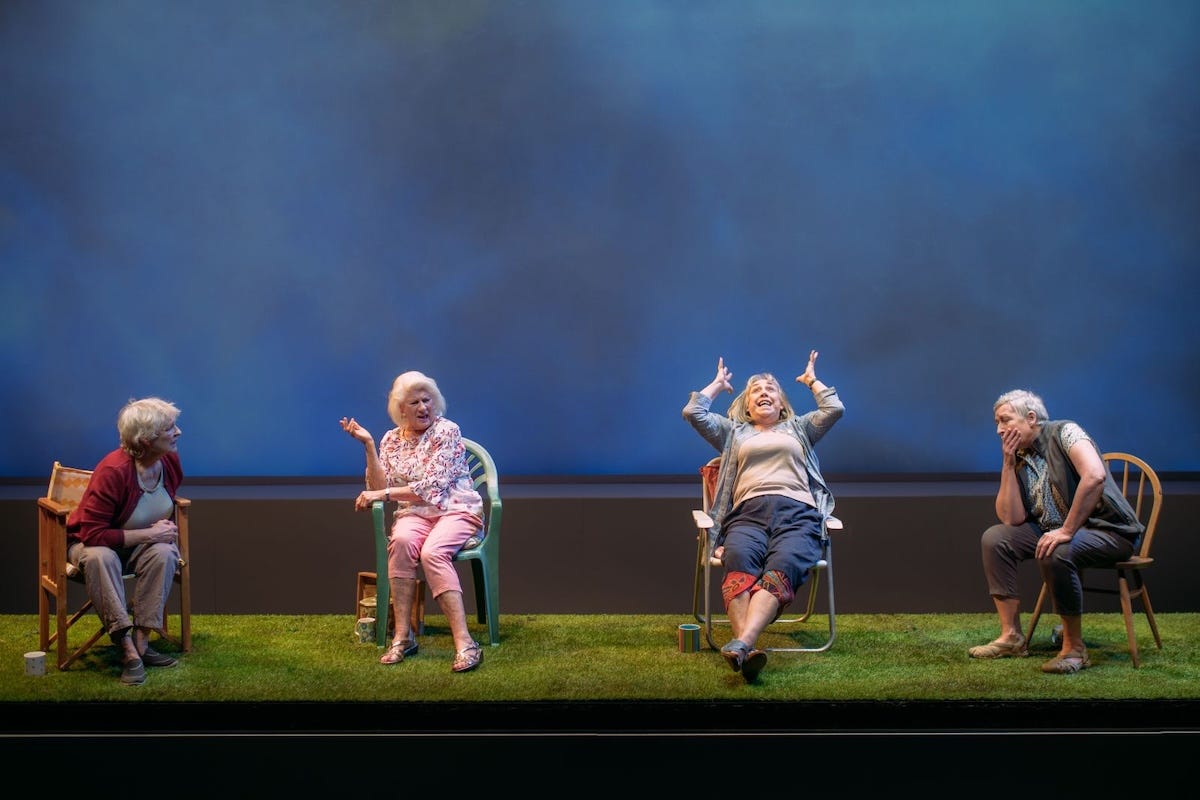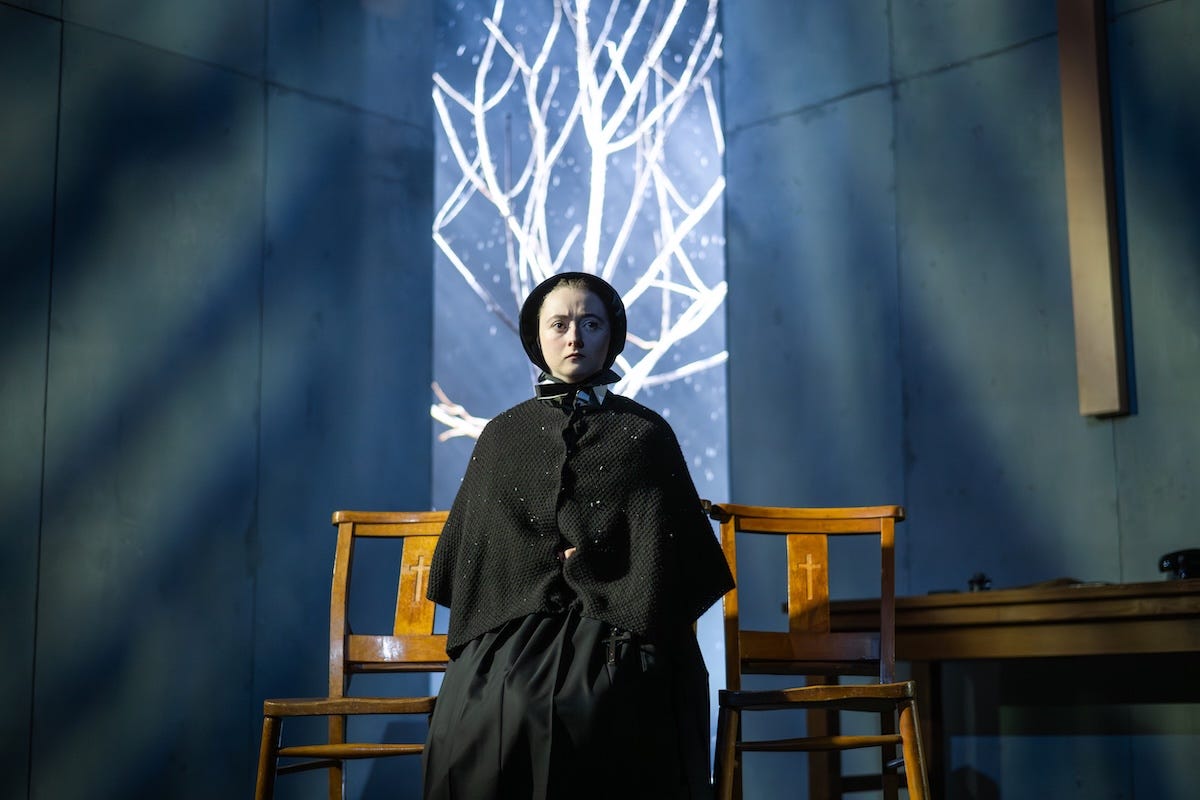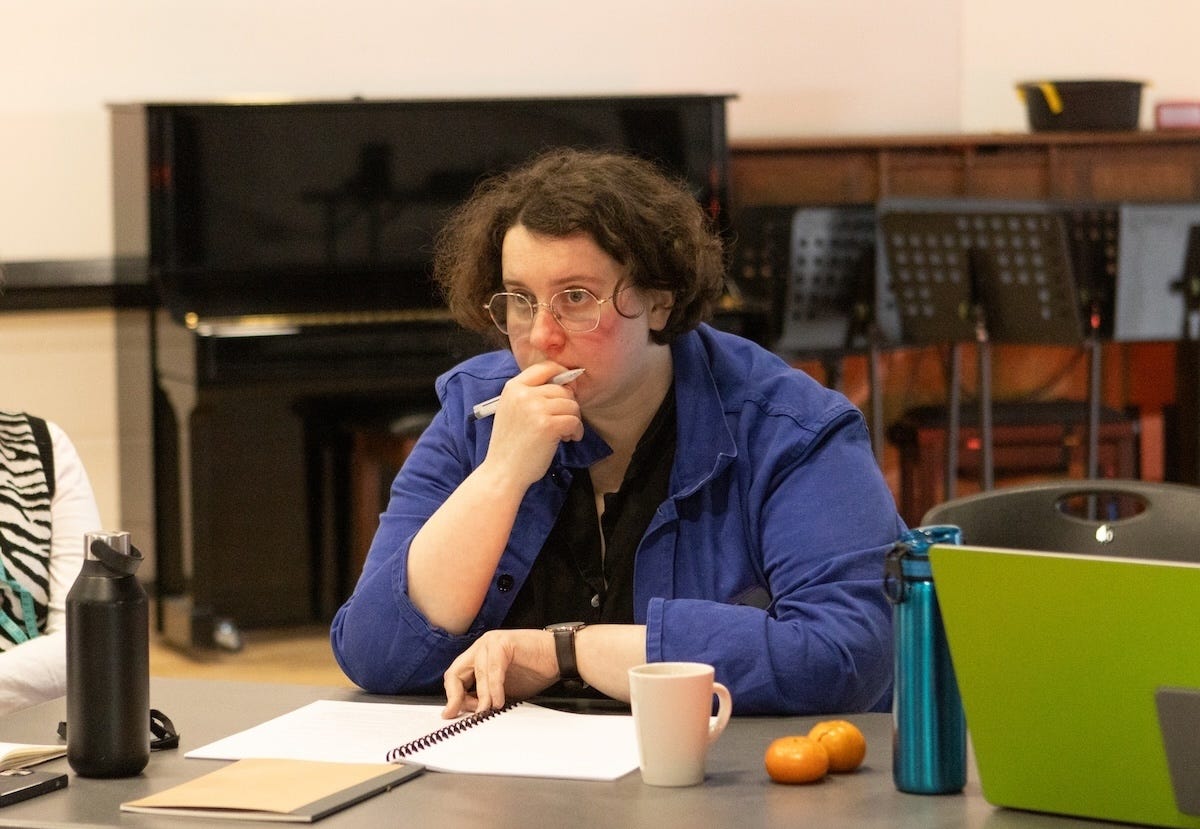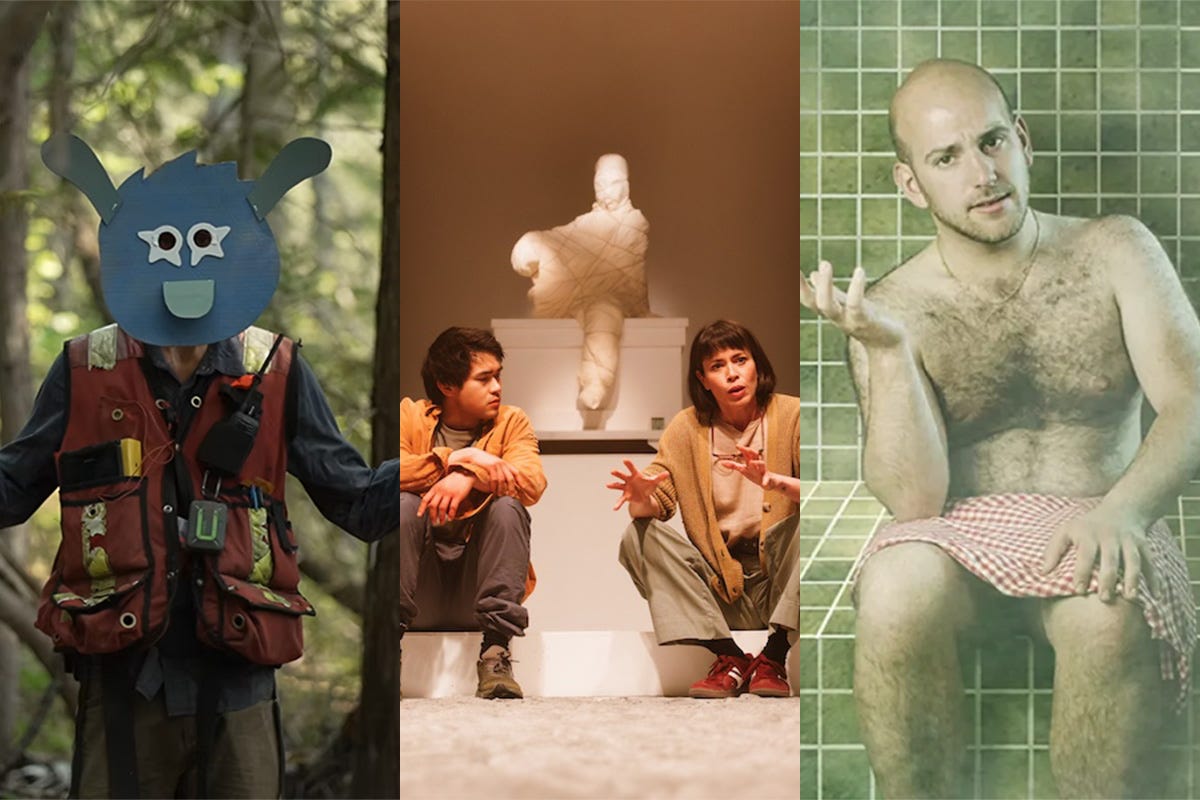"I met Caryl Churchill in a café in Hackney. She was cooler than everyone else there."
Glasgow-based director Joanna Bowman on her acclaimed productions of Escaped Alone and Doubt: A Parable. Plus: three shows to see next week.
Hello, and welcome to The Crush Bar, a newsletter about theatre by Fergus Morgan.
This is the free Friday issue, which usually contains an interview with an exciting theatremaker or an essay on a theatre-related topic. This week, it is a chat with director Joanna Bowman, whose staging of John Patrick Shanley’s Doubt: A Parable is currently running in Dundee. After that, there are your usual show recommendations.
In case you missed it, here is this week’s issue of Shouts and Murmurs, which is a weekly round-up of the most interesting writing about theatre elsewhere…
You can get Shouts and Murmurs straight in your inbox every Tuesday - and help keep this newsletter going - by signing up as a paid supporter of The Crush Bar.
Theatres, companies, agencies and other organisations can also sign-up as champion supporters of The Crush Bar, which gets their name in this dedicated tab on The Crush Bar’s Substack homepage and in the footer of every Friday issue.
A few weeks ago, a producer asked me who I thought the most exciting director in Scotland was. I said Joanna Bowman.
Bowman’s distilled, disturbing staging of Caryl Churchill’s modern classic Escaped Alone at the Tron Theatre last year – the play’s Scottish premiere – is probably the best production I have seen in Scotland since moving here six years ago. Prior to that, in 2023, she delivered a dazzling staging of Ross Willis’ Wolfie at the same venue – another Scottish premiere – and her bleak, brutalist revival of Doubt: A Parable, John Patrick Shanley’s Pulitzer Prize-winner about a progressive priest being accused of abuse at a New York Catholic school, is currently running at Dundee Rep.
Born in 1994, Bowman grew up in London and fell in love with theatre through seeing shows at the National Theatre via its much-loved, much-missed Travelex cheap ticket scheme. She went on to study English and Modern History at the University of St Andrews, where she threw herself into student theatre, then completed an MFA in theatre directing at Birkbeck, as part of which she undertook a professional placement at Glasgow’s Citizens Theatre. Since then, she has held positions at Chichester Festival Theatre, where she staged Harry Davies’ The Inquiry in 2023; at the Tron Theatre, where she was an associate director until last year; and with the Glasgow-based international company Vanishing Point, with whom she is currently a creative associate. Her next job is with the Royal Shakespeare Company: a family-friendly adaptation of The Two Gentlemen Of Verona in Stratford-upon Avon in August.
I saw your production of Doubt: A Parable in Dundee last week and really liked it. What attracted you to the play?
Andrew Panton [artistic director of Dundee Rep] asked me to direct it. I was attracted to it because I think there is genuine ambiguity in the play, which a lot of work resists. A lot of plays are interested in telling the audience something or reaffirming something they already believe. I read The Guardian. My beliefs are affirmed to me every day. I am interested in not knowing what to think. Genuinely not knowing something is exciting. That is what is so great about this play. It asks the audience to have an opinion without applying pressure in either direction.
A lot of reviews of Doubt: A Parable point out that it feels timely. In mine, I said that “its searching contemplation of patriarchal power structures, the temptations of wilful ignorance and the scouring power of certitude could easily have been written about our era of corrupt institutions and social media absolutism.” How about that?
The word “relevance” sends chills down my spine slightly. I think good work is always relevant. Any good play will always have something to say about the mad and wonderful experience of being alive. Having given that big caveat, though, I do think that we are reassessing our relationship with institutions at the moment because social media has resulted in every voice having the same weight.
Your production looks great, too. The set looks like something Adrian Brody’s character in The Brutalist would design.
Jess [Worrall, designer] and I wanted to set the play in an oppressive space, somewhere that you would damage or disturb if you shouted in it, somewhere you had to listen to each other. I actually saw The Brutalist as we were designing the show. One of the key influences on that film was the conceptual artist James Turrell. I’d just been in Japan with Vanishing Point and stayed in one of Turrell’s houses while I was out there. All of those influences came together in the set.
It is very austere and spare and stripped-back.
I’m always interested in how you can do as much as possible with as little as possible. It seemed to me like Doubt: A Parable was a play that could take that aesthetic economy. There are three chairs, a table and about four props. There was a point where Richard [Bell, sound designer] wanted to put a speaker in the set. Usually, you can put a fake air vent in or something. The minute we did anything like that, though, the balance of the play went wonky. That was really interesting. Any excess pressure in any direction and the whole thing felt unbalanced.
I have to ask about Escaped Alone, which I thought was incredible when I saw it at the Royal Court in 2016 and incredible in your revival at the Tron Theatre last year.
It is funny because the Tron Theatre was actually quite resistant to doing that play because they thought it was too short. I just said: “When have you ever seen a play and wished it was longer?” Even with the best plays I’ve ever seen, I have not been like: ‘God, I wish that was five minutes longer.”
The extraordinary thing about Escaped Alone is that there is nothing that is not essential in that play. My actors always, hopefully lovingly, mock me for my attention to punctuation. Escaped Alone is a play where punctuation matters, though. It matters that it is a comma. It matters that it is a full stop.
Your production got some great reviews and won Best Production, Best Ensemble and Best Director at the Critics Awards for Theatre in Scotland. You must have been delighted.
I was. I’m very rarely pleased with my work. I think of directing as an experiment in which you get as close as you can to a vision. With Escaped Alone, though, I was like: ‘Oh, this is really good.’ I felt like it was a good indication of the kind of work I want to make. Working with those women [cast members Anne Kidd, Joanna Tope, Irene Macdougall and Blythe Duff] was extraordinary, too. You never get four women of that age in a room together professionally.
Did you have any contact with Caryl Churchill?
I met her in this café in Hackney full of posers like me. She walked in and was cooler than everyone else there. She was so uninterested in anything that wasn’t about the text. She was uninterested in discussing anything generic or general, but the minute I asked why something was a comma not a full stop, she went on for about five minutes. I loved talking to Caryl. I can’t believe I just called her Caryl.
You grew up in London. Did you go to the theatre a lot?
An awful lot. Neither of my parents work in theatre, but they both really like it, although they like very different stuff. My dad likes Shakespeare and my mum likes plays with the word ‘fuck’ in them. I went a lot with them, but I also went to see a lot at the National Theatre through the Travelex tickets scheme. After The Dance. Time and the Conways. Emperor and Galilean. London Road. Loads of Katie Mitchell shows. Everything in The Shed. I think the importance of seeing other people’s work cannot be understated when it comes to learning how to make theatre. I saw loads at the Royal Court as well. Mad Anthony Nielson plays. Brilliant debbie tucker green plays. Anya Reiss’s first play. Kin. Spur of the Moment. It was amazing.
How did you get into directing? Did you ever want to act?
I can’t think of anything worse than being an actor. I directed loads and loads of stuff at university. I think I did 16 plays, all of which were terrible in different ways. I did Sarah Kane. I did Ibsen. I did Simon Stephens. I did Polly Stenham. I did Martin Crimp. I just experimented with style and genre. I did a play in the dark. I did a play without a stage. I think because there is nothing to do in St Andrews there is a thriving culture of students doing stuff themselves. Like, if I wanted to see a Martin Crimp play, I was going to have to stage a Martin Crimp play.
What attracts you to a play now?
There are three things that make me want to direct a play. One is that I don’t know how to stage it, so I have to work something out. Another is that there is something distinctively theatrical about it, something that means it has to be theatre. And the third is that it has to be good, which is difficult to define. It is not enough just to have nice vibes or nice visuals, though. The writing has to be robust. For me, it does always begin with the words on the page, but there has to be space within those words for some kind of theatrical transformation. I think that if the words don’t work, the play won’t work, no matter how good the production is.
You left Scotland to train at Birkbeck, then returned to work with the Citizens Theatre, then left to work at Chichester Festival Theatre, then came back again.
I did. I got a job in Glasgow as an associate director with Vanishing Point and I was doing that when we went into lockdown. I ended up falling love with Glasgow, both as a place to work but also as a place to live. I feel very committed to Scotland. I will go where the work is and I’m thrilled to have the opportunity to make work with the RSC and places like that, but my life is here. I like being in Scotland.
One thing I find a bit frustrating, as a theatre nerd like you, is that you just don’t get to see many different shows and artists in Scotland. That is partly because there are fewer theatres and partly because those theatres are struggling financially, of course, but I do wish they were more adventurous sometimes.
I completely agree with that. I go down to London at least once a month to see work because it is my favourite thing in the world. I think part of the problem is that the theatre where my taste would naturally align is the Citz, and that has been closed for a long time. I do wish there was more variety, though. I think there is an appetite for it. Perhaps this is indiscreet, but the Tron budgeted for Escaped Alone to play to 55 per-cent capacity. It hit 89 per-cent, which went up to above 90 per-cent in the final performances. I really believe that Scottish audiences want work that is rigorous and thought-provoking and resists categorisation.
How hard have you found it to build a career as a director?
I have been lucky. The associate position I had at the Tron, which came about as a result of Cultural Recovery Fund money, was an extraordinary opportunity. It meant I had the opportunity to choose to direct Wolfie and Escaped Alone. Increasingly, I am realising that it will not always be like that. I think it is about getting to a place where artistic leaders can trust you, a place where, on paper, an idea might not sound great, but because you are involved, and you will do it with the care and attention and rigor that you have done things previously, it appeals.
Would you ever like to run a building?
I think the dream job for any director is an associate position in a building, where you get to direct shows and be involved with programming and be part of all those conversations, but you don’t need to worry about actually running the building. That said, I would love to run a building one day, but it has to be the right one at the right time. I don’t envy people who are artistic directors at the moment.
Next, you are staging The Two Gentlemen Of Verona with the Royal Shakespeare Company. How did that come about?
The RSC did a course for early-to-mid-career directors who were interested in doing Shakespeare. We did some stuff with Cheek By Jowl and Rob Icke. I already had a relationship with Daniel because of working at Chichester Festival Theatre. Because of that relationship, and because that course cracked something open for me, they got in touch and asked if I wanted to direct The Two Gentlemen Of Verona.
I have never seen The Two Gentlemen Of Verona.
Don’t worry, no-one has. It is an interesting play, possibly Shakespeare’s first. It is basically a story about two young men fucking up. There are thirteen characters, but the structure is essentially a series of duologues that vary wildly in tone, then there is a big, difficult Act V Scene IV with some casual sexual violence and forgiveness. I am doing a family-friendly version of it in-the-round in The Other Place. The idea of family-friendly summer Shakespeare conjures up images of actor-musicians and picnics for me. I am interested in how it could be done differently.
What else would you like to do?
I’d love to do more Shakespeare. I’d love to do some Ibsen and some Chekhov. I’d love to do some Annie Baker. I’d like to do the first Scottish productions of superb plays. One of the joys of doing Wolfie and Escaped Alone was that I already knew those plays worked because they had been done before, and I had the chance to reinterpret them and introduce them to a new audience. I’d like to do more of that.
Doubt: A Parable runs at Dundee Rep until May 10. The Two Gentlemen Of Verona runs at the Royal Shakespeare Company from August 4 until August 31.
Three shows to see next week
Gateshead International Festival of Theatre - various, until May 4
The Gateshead International Festival of Theatre returns for its fifteenth edition this weekend, with workshops, exhibitions, installations and performances - including an experimental opera about peat bogs, a one-on-one show involving sleight-of-hand magic, and a night-time audio experience - taking place in a range of venues around the town. You can check out the programme and get tickets via the button below.
Scenes From A Repatriation - Royal Court Theatre, until May 24
Singaporean playwright Joel Tan featured in this newsletter a fortnight ago, discussing his new play Scenes From A Repatriation, which opened Upstairs at the Royal Court Theatre earlier this week to some great reviews. Directed by Emma Clark and PJ Stanley - aka emma + pj, also former interviewees in The Crush Bar - it presents a kaleidoscopic series of encounters, all focused around an imaginary Chinese artefact held in the British Museum. You can get tickets via the button below.
Bubble Schmeisis - Soho Theatre, until May 10
Nick Cassenbaum was also interviewed in this newsletter recently, ahead of his hit Edinburgh Fringe play Revenge: After The Levoyah transferring to the Yard Theatre. Now, he is reviving his debut solo show Bubble Schmeisis - a comedy about East London’s Jewish community set in a schvitz - for a farewell run at Soho Theatre, ten years after he first performed it. You can get tickets via the button below.
Thanks for reading and supporting The Crush Bar
Thanks to all 4266 subscribers, to all 133 paid supporters, and particularly to The Crush Bar’s champion supporters, whose contributions make all this possible.
The Royal Court Theatre, Ellie Keel Productions, The Women’s Prize For Playwriting, Francesca Moody Productions, Raw Material Arts, Jermyn Street Theatre; Hampstead Theatre; Storytelling PR
Your organisation can become a champion supporter of The Crush Bar, join that list, and help keep its independent coverage of theatre going via the button below.
That is it for this week. If you want to get in touch about anything raised in this issue - or anything at all - just reply to this newsletter, or email me at fergusmorgan@hotmail.co.uk, or you can find me on Bluesky.
Fergus












